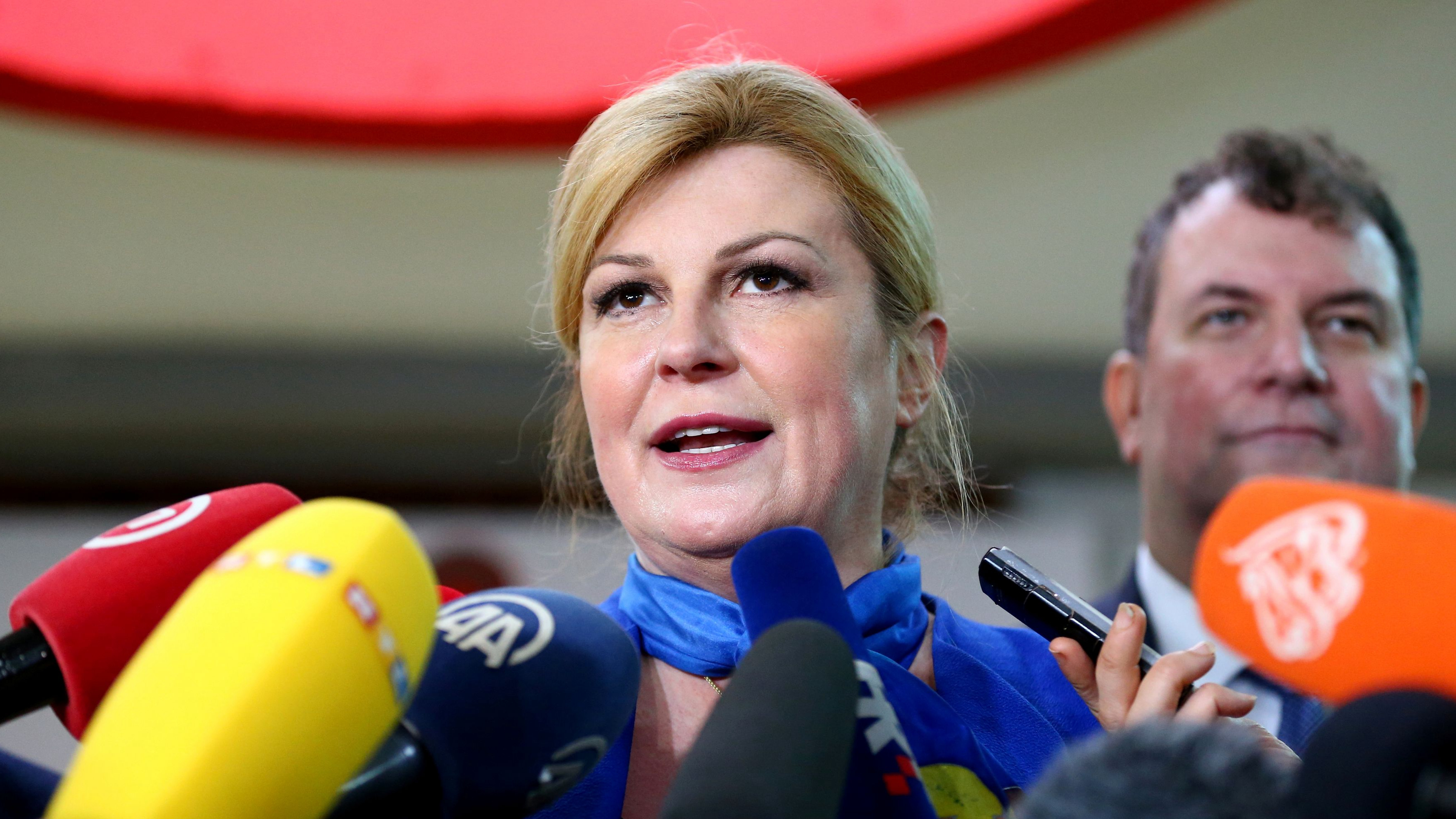Croatia's former prime minister Zoran Milanovic is heading into a run-off presidential race with the country's incumbent President Kolinda Grabar-Kitarovic.
Social Democrat Milanovic came out on top in the first round of voting, the State Electoral Commission said on Sunday after 99 percent of votes were counted.
Milanovic got 29.5 percent of the votes ahead of Grabar-Kitarovic, the candidate of the ruling Croatian Democratic Union (HDZ), with 26.7 percent.

Croatian President and presidential candidate Kolinda Grabar-Kitarovic talks to the media after casting her ballot during the presidential election in Zagreb, Croatia, December 22, 2019. /Reuters Photo
Croatian President and presidential candidate Kolinda Grabar-Kitarovic talks to the media after casting her ballot during the presidential election in Zagreb, Croatia, December 22, 2019. /Reuters Photo
Independent candidate Miroslav Skoro, a popular singer with conservative nationalist-leaning views, came in third with 24.4 percent of the vote.
Milanovic and Grabar-Kitarovic will contest a run-off election on January 5, 2020.
The first round of the presidential election took place just days before the country takes over the European Union presidency for the first time.
What is the president's role?
Largely ceremonial: The prime minister holds Croatia's main power in government. However, the president does have a say in foreign policy and defense issues.
What is at stake in this election?
The outcome of Sunday's vote is seen as a key test for political parties. Keeping the presidency is important for the ruling conservative Croatian Democratic Union party (HDZ) as its government prepares to assume the rotating EU chairmanship for the coming six months.
After Boris Johnson's Conservatives won the election in the UK, Croatia appears set to preside over Brexit and the start of key negotiations on the future relationship between Britain and the EU.

The 53-year-old presidential candidate Zoran Milanovic is already a familiar face after serving as prime minister from 2011 to 2016. (Credit: AP Photo/Darko Vojinovic)
The 53-year-old presidential candidate Zoran Milanovic is already a familiar face after serving as prime minister from 2011 to 2016. (Credit: AP Photo/Darko Vojinovic)
Who are the run-off candidates?
Incumbent Kolinda Grabar-Kitarovic – the country's first female president – is running for a second term. She began her campaign with a comfortable lead in opinion polls, but lost ground after a series of gaffes.
Most notably, the 51-year-old president raised eyebrows in November after she sang at the birthday party of Zagreb's scandal-hit mayor Milan Bandic and said she would "bring (him) cakes... in prison" if he is convicted on a slew of corruption charges.
Apparently an effort to win over the mayor's supporters, the comments did little to inspire voters fed up with what they see as endemic corruption.

Voters in Croatia went to the polls Sunday to pick a new president in a tight, holiday-season election race. (Credit: AP Photo/Darko Bandic)
Voters in Croatia went to the polls Sunday to pick a new president in a tight, holiday-season election race. (Credit: AP Photo/Darko Bandic)
Former Social Democrat prime minister Zoran Milanovic is hoping to benefit from a divided right. He promises to make Croatia a "normal country" that respects minorities and has an independent judiciary. But enthusiasm for him dimmed after his government failed to halt the culture of patronage and boost the economy.
One of the EU's poorest members since joining in 2013, Croatia faces no shortage of pressing challenges. Yet the presidential campaign has been decidedly backward-looking as rivals attack each other with war-era grievances.
The latest opinion poll from Promocija Plus agency put Grabar-Kitarovic at 28 percent, with Milanovic on her heels just two points behind.
Grabar-Kitarovic has herself tried to placate nationalists in the past – including failing to clearly condemn growing nostalgia for Croatia's pro-Nazi WWII regime.
This year she announced her re-election bid in a far-right magazine. If Grabar-Kitarovic loses, analysts say it could spell trouble for HDZ's moderate prime minister Andrej Plenkovic in next year's parliamentary poll.
Where is Croatia heading?
The Adriatic nation of 4.1 million people is a magnet for tourists but no paradise for locals, who are leaving in droves to escape a sluggish economy and widespread corruption.
In the eyes of its Balkan neighbors, Croatia is the lucky one, having managed to join the European Union six years ago. Yet its people are still leaving the country in droves – citing the same problems that haunt the rest of the region.
As Zagreb prepares to take charge of the EU's rotating presidency on January 1, the government is grappling with how to curb an emigration exodus that has been emptying swathes of the country.
Since joining the bloc, Croatian exports have risen and the country has welcomed EU funds for infrastructure and other projects. But the average monthly salary of $960 still can't compete with those in richer member states, and the corruption and nepotism plaguing the rest of the Balkans are still alive in Croatia too.
Opening up the borders has in fact made emigration easier, with 15.4 percent of working-age Croats now living in other EU countries, according to Eurostat. That's the second-highest proportion within the bloc after Romania. Since its EU entry in 2013, 190,000 people have left the country, according to official data, though experts say the real number is likely closer to 300,000.
The country's GDP per capita is still the second lowest in the EU after Bulgaria, Eurostat data showed in June. The country's unemployment rate was 6.6 percent in 2019. The economy is also hugely dependent on the tourism sector, where businesses are increasingly relying on immigrants from neighboring Balkan states to plug labor gaps. The government acknowledges the problem and has struggled to reverse it.
A neighbor to aspiring EU hopefuls in the Western Balkans, Croatia is expected to help revive the prospect of EU enlargement next year, which stalled recently when France blocked the opening of accession talks with North Macedonia and Albania.
The country is also hoping to join Europe's border-free Schengen area and introduce the euro currency.
Source(s): AP
,AFP
,Reuters